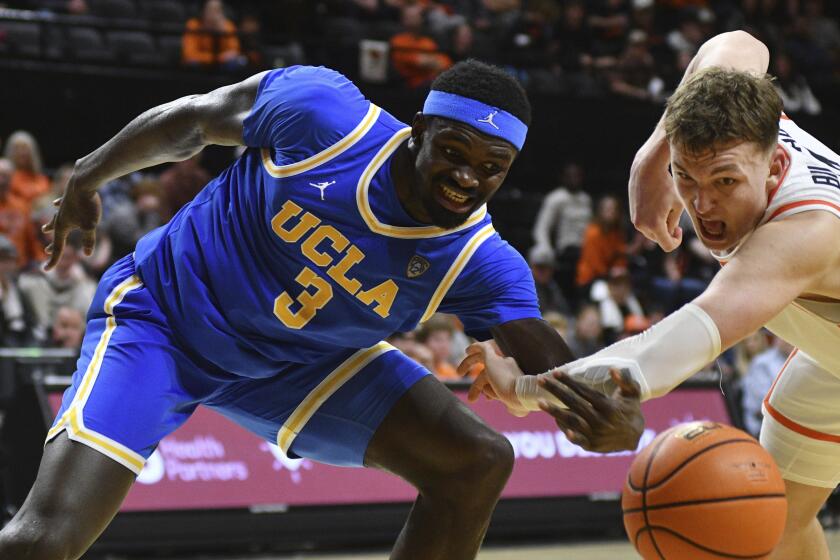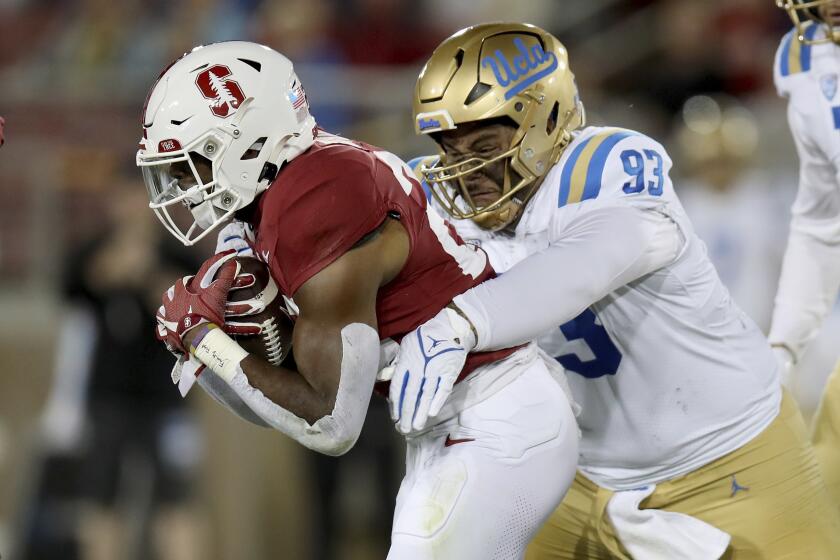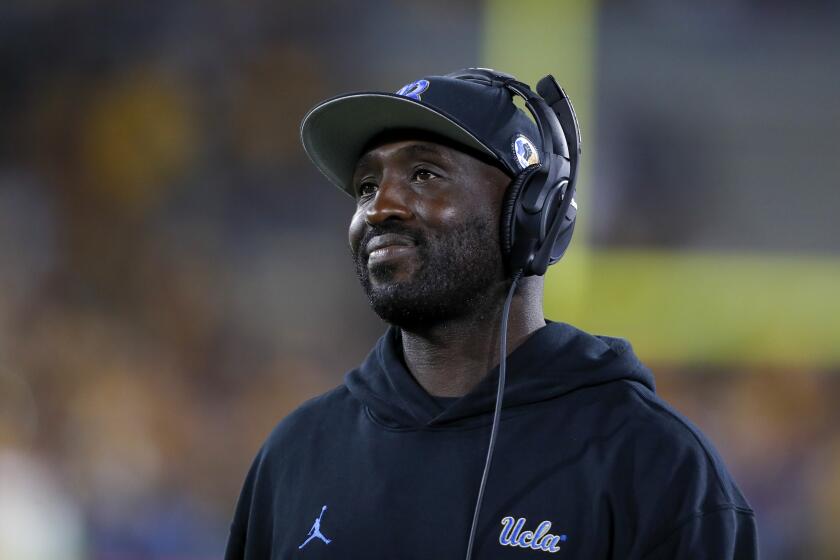THE THIN BLUE LINE
A black hole has opened up on the UCLA football roster, and no, that’s not a reference to the quarterback situation.
The bottom line with this team is line play, and recently right tackles have been disappearing like cookies at a day care center.
Aleksey Lanis retired because of chronic knee problems. Sean Sheller was lost for the season after an ATV accident. Donovan Edwards, a community college transfer expected to compete for the starting job, was unable to meet admission requirements. Mike Harris, expected to compete for the job when training camp started, is out several weeks because of a high ankle sprain.
Call it the Bermuda Tackle. Line up there at your own risk.
“It’s been weird,” said Nick Ekbatani, currently the projected starter at that spot, “but put me on the chart. I’m not worried.”
If only Bruins fans -- and quarterbacks -- could say the same. If the line doesn’t develop, it won’t matter who the quarterback is.
The question marks up front start at Ekbatani’s tackle spot and read right to left. The only returning players with experience are center Micah Reed, a walk-on two seasons ago, and tackle Micah Kia, who lost his starting job eight games into the 2007 season.
Still, this is not some mystical occurrence, beyond the control of the Bruins’ new coaching staff. This is recruiting science, also beyond the control of the Bruins’ new coaching staff.
UCLA, which produced Jonathan Ogden, Randy Cross, Dave Dalby and Max Montoya, has not had an offensive lineman drafted by the NFL since Kris Farris in 1999. The cupboard was particularly bare after last season, a big reason why offensive line coach Bob Palcic was brought in by first-year Coach Rick Neuheisel.
“I can’t say I have ever had a challenge like this before,” said Palcic, who was the Bruins’ offensive line coach during the 1993 season. “It’s the most inexperienced offensive line that I have ever been associated with, but they’re good kids. They’re willing to work, but at this point we have a long, long way to go.”
Palcic arrived with an impressive resume, coming off a two-year stint at Wisconsin, where he coached Joe Thomas, who won the Outland Trophy as college football’s top lineman in 2006.
At UCLA, he was given charge of a crew that has more outcasts than Outlands. And more converts than an old Billy Graham revival.
Guard Scott Glicksberg is a converted tight end. Guard Darius Savage is a converted defensive tackle. Nate Chandler, a backup tackle, is a converted tight end.
It’s a night-and-day difference from the last UCLA line Palcic was handed. Craig Novitsky and Vaughn Parker were both All-Americans in 1993. The group also included Ogden, the 1995 Outland Trophy winner, and Mike Flanagan.
The Bruins reached the 1994 Rose Bowl. Parker, Ogden and Flanagan all spent more than a decade in the NFL.
“I had one of the very best offensive lines in college football, if not the best,” said Palcic, who spent 12 seasons coaching in the NFL after leaving UCLA.
The situation has deteriorated significantly since.
Farris, who won the Outland Trophy in 1998, was the last All-American offensive lineman developed at UCLA. The Bruins have had only one offensive lineman selected first-team All-Pacific 10 Conference since then.
“I can’t tell you why the well dried up,” former UCLA coach Terry Donahue said. “When I left UCLA in 1995, our left tackle was Jonathan Ogden and his backup was Kris Farris and they both won the Outland Trophy. All of a sudden, after three years, [coach] Bob Toledo didn’t get those kinds of players.
“The offensive line is maybe the most critical position on your team. If you have a strong offensive line, with roughnecks who dominate the game, everything falls into place. The running game happens and the pass protection occurs.”
The Bruins gave up 36 sacks last season, ranking 102nd out of 119 Division I teams. They averaged 3.7 yards a rush, ranking 89th.
There was plenty of room to improve, and the head coach says that’s what is happening.
“In terms of weightlifting and all the efforts that went on this summer, we look more like a college offensive line should look,” Neuheisel said. “We have able bodies but probably not enough of them there to feel real comfortable.”
But, he added, “When you’re gaining strength physically, you can’t help but gain mental strength.”
Motivation hasn’t been a problem.
“During the off-season, we kept reminding them what everyone was saying about them,” defensive tackle Brigham Harwell said.
The talk was deafening and “it made us a little salty,” Glicksberg said.
“It’s in their heads, they’ve all heard what’s being said,” said Mike Linn, the Bruins’ athletic performance coach who spent the summer with the team in the weight room.
“They worked their butts off and are committed to trying to change everybody’s opinion of them.”
For now, questions remain about experience and depth.
Losing Lanis, Sheller and Edwards sapped the Bruins of numbers. Ekbatani was slated to be a backup center and guard but is now topping the charts at right tackle. He had limited playing time at guard in four games during the 2006 season, which makes him the team’s third-most experienced lineman.
Others can also ponder what a long, strange trip it has been
Glicksberg was a lineman who couldn’t put on weight, so he shifted to tight end. Now he’s back at guard -- and up to 300 pounds, according to the team’s media guide.
Savage started as a defensive tackle, chose track and field over spring practice in 2007, then put his shotput career on hold last spring to convert to offensive line.
Adam Heater was moved from tight end to center in spring, then moved back this summer.
The mixing and matching has ended, the teaching accelerated.
“I want to do a few things well,” Palcic said. “I’m not going to overburden these kids mentally. I really want to focus in on their techniques and their ability to play fast. I don’t want to have to have them think.
“They have all the good qualities you look for, now it is up to me to develop these kids so they can be most successful.”
--
Go beyond the scoreboard
Get the latest on L.A.'s teams in the daily Sports Report newsletter.
You may occasionally receive promotional content from the Los Angeles Times.




